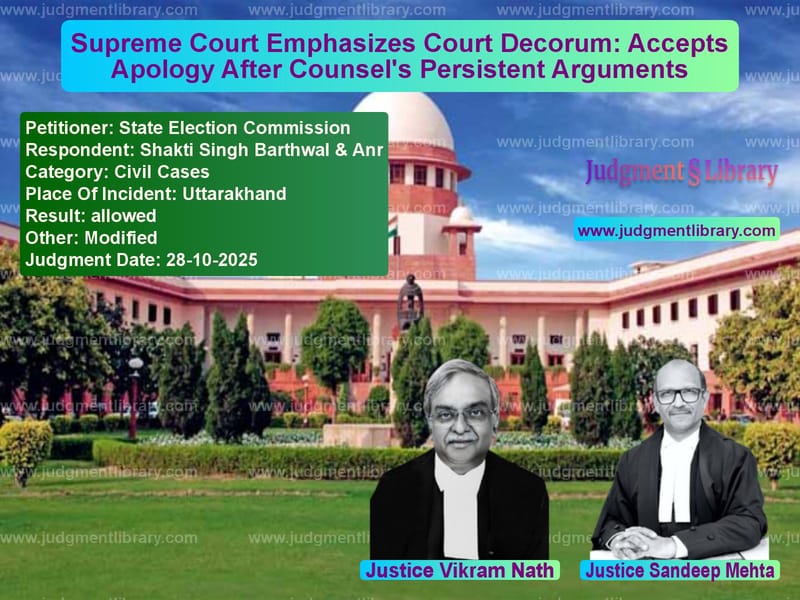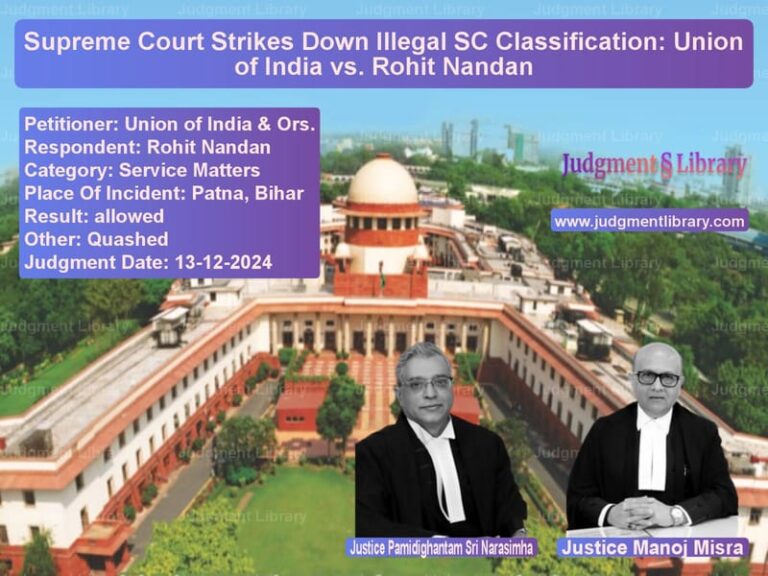Supreme Court Emphasizes Court Decorum: Accepts Apology After Counsel’s Persistent Arguments
In a significant ruling that underscores the importance of maintaining decorum in court proceedings, the Supreme Court of India recently dealt with a unique case where it had to balance the need for respectful advocacy with the recognition of genuine remorse. The case involved a miscellaneous application filed by the State Election Commission seeking modification of an earlier order where the Court had imposed costs and made adverse remarks against the arguing counsel for persistent arguments despite the Court’s clear indication of its view. This judgment provides important insights into the expectations from lawyers regarding court decorum while also demonstrating the Court’s capacity for compassion when faced with sincere apologies.
The Background of the Case
The matter originated from a Special Leave Petition (SLP No. 27946 of 2025) filed by the State Election Commission of Uttarakhand against an interlocutory order passed by the High Court. The High Court had stayed a clarification issued by the Election Commission on the premise that it was contrary to statutory provisions. When the matter came before the Supreme Court on September 26, 2025, the Court formed a clear view that the matter did not deserve interference. However, what transpired during the hearing led to the Court passing an unusually strong order.
The Original Order and Its Consequences
In its order dated September 26, 2025, the Supreme Court made some strong observations about the conduct of the arguing counsel for the petitioner. The Court noted in its original order: “Despite our communicating to the learned counsel that the matter does not deserve any interference at least six times the counsel continued to insist that this Court must pass some order.”
The Court expressed its displeasure with this approach, stating: “We are pained at this approach and accordingly, the petition stands dismissed with cost of Rs. 2,00,000/-(Rupees Two Lakhs only) on the Commission to be deposited with the Supreme Court Legal Services Committee within four weeks from today.”
This order was significant because it not only dismissed the petition but also imposed substantial costs and contained adverse remarks about the counsel’s conduct, reflecting the Court’s serious concern about maintaining the dignity and efficiency of court proceedings.
The Miscellaneous Application for Modification
Following this order, the State Election Commission filed Miscellaneous Application No. 1901 of 2025 seeking modification of the September 26, 2025 order. The applicant prayed for three specific reliefs: first, to expunge the observations relating to the conduct of the arguing counsel; second, to waive the costs imposed upon the petitioner; and third, any other orders the Court deemed fit and proper.
When this application came up for hearing, the Court had the opportunity to reconsider its earlier stance in light of the developments that had occurred since the original order.
The Apology and the Court’s Deliberation
During the hearing of the miscellaneous application, the Court noted that “An unconditional and bona fide apology has been tendered by the applicant before the Court.” This apology became the central factor in the Court’s reconsideration of the matter.
The Court used this opportunity to elaborate on the expectations from counsel during court proceedings. In words that carry significant importance for the legal profession, the Court observed: “It must be appreciated that once the Court has indicated its mind and requested the counsel to refrain from further submissions, the same is expected to be respected. Orders are passed by the Court only after due consideration. The Court is always mindful of the submissions advanced and does not dismiss the matters without careful examination. Continued insistence thereafter, especially after the Court expressed its inclination, serves no purpose and affects the decorum of proceedings.”
The Balance Between Duty to Client and Court Decorum
The judgment provides valuable guidance on one of the most challenging aspects of legal practice – balancing the duty towards the client with the responsibility to maintain court decorum. The Court eloquently stated: “There needs to be a balance in the duty that advocate has towards his/her client and the Court. The orderly and dignified functioning of the Court is best ensured when the Bench and the Bar move in symphony with each other.”
This observation highlights the symbiotic relationship between the judiciary and the legal profession, emphasizing that both need to work in harmony for the effective administration of justice. The Court’s message was clear: while lawyers have a duty to vigorously represent their clients, this duty must be exercised within the boundaries of professional decorum and respect for the court’s processes.
The Role of Senior Members of the Bar
An interesting aspect of this case was the intervention of senior members of the legal fraternity. The Court noted that “the leaders of the Bar Mr. Vikas Singh, Senior Advocate and Mr. Vipin Nair, Advocate have assured the Court that this would not happen again.”
This intervention demonstrates the important role that senior members of the Bar play in maintaining professional standards and assisting the Court in matters of professional conduct. Their assurance likely carried significant weight in the Court’s decision-making process, reflecting the collective responsibility of the legal profession to uphold the dignity of judicial proceedings.
The Court’s Compassionate Decision
Despite the seriousness of the conduct that prompted the original order, the Court showed compassion in its final decision. The Court noted that “Normally, the application would have been rejected but the Counsel himself present in Court has expressed remorse and the leaders of the Bar… have assured the Court that this would not happen again.”
The Court further explained its reasoning: “In view of the above, considering the unqualified and unconditional apology tendered by the learned Counsel and this being his first such incident before this Bench, we are inclined to allow the application with a caution that such conduct should not be repeated in future.”
Accordingly, the Court allowed the application and modified its earlier order “to the extent that the adverse remarks and the cost imposed are deleted.”
Significance of the Judgment
This judgment is significant for several reasons. First, it serves as an important reminder to lawyers about the boundaries of advocacy. While lawyers have a duty to represent their clients zealously, this must be balanced with respect for the court’s processes and decorum. The judgment makes it clear that once the Court has indicated its view, continued insistence serves no productive purpose and may actually be counterproductive.
Second, the judgment demonstrates the Supreme Court’s role not just as an adjudicator but also as a guardian of professional standards in the legal profession. By addressing the issue of courtroom decorum directly, the Court reinforces the standards expected from members of the Bar.
Third, the judgment shows the Court’s capacity for compassion and its willingness to reconsider its decisions when presented with genuine remorse and assurances of improved conduct. This balanced approach ensures that the Court maintains its authority while also recognizing the human element in legal practice.
Fourth, the case highlights the importance of apologies in the legal process. The unconditional and bona fide apology, coupled with assurances from senior members of the Bar, played a crucial role in the Court’s decision to modify its earlier order.
Broader Implications for Legal Practice
This judgment has broader implications for legal practice in India. It reinforces the principle that advocacy should be persuasive but not persistent to the point of disregarding the Court’s indications. Lawyers need to develop the skill of recognizing when further arguments would be futile and potentially damaging to their client’s cause.
The case also underscores the importance of the relationship between the Bench and the Bar. As the Court noted, the best outcomes are achieved when both work in “symphony” with each other. This requires mutual respect, understanding of respective roles, and recognition of the boundaries within which each operates.
For young lawyers, this judgment serves as an important lesson in professional conduct. It emphasizes that while vigorous representation is expected, it must always be tempered with respect for the court’s processes and dignity.
In conclusion, this Supreme Court judgment strikes a careful balance between maintaining the authority and decorum of court proceedings and showing compassion when faced with genuine remorse. It serves as both a warning and a guidance to the legal profession about the expectations from counsel while also demonstrating the Court’s capacity for mercy when apologies are sincere and lessons are learned. The judgment ultimately strengthens the justice delivery system by reinforcing the standards of professional conduct while acknowledging the human aspects of legal practice.
Petitioner Name: State Election Commission.Respondent Name: Shakti Singh Barthwal & Anr.Judgment By: Justice Vikram Nath, Justice Sandeep Mehta.Place Of Incident: Uttarakhand.Judgment Date: 28-10-2025.Result: allowed.
Don’t miss out on the full details! Download the complete judgment in PDF format below and gain valuable insights instantly!
Download Judgment: state-election-commi-vs-shakti-singh-barthwa-supreme-court-of-india-judgment-dated-28-10-2025.pdf
Directly Download Judgment: Directly download this Judgment
See all petitions in Legal Malpractice
See all petitions in Contempt Of Court cases
See all petitions in Other Cases
See all petitions in Judgment by Vikram Nath
See all petitions in Judgment by Sandeep Mehta
See all petitions in allowed
See all petitions in Modified
See all petitions in supreme court of India judgments October 2025
See all petitions in 2025 judgments
See all posts in Civil Cases Category
See all allowed petitions in Civil Cases Category
See all Dismissed petitions in Civil Cases Category
See all partially allowed petitions in Civil Cases Category







